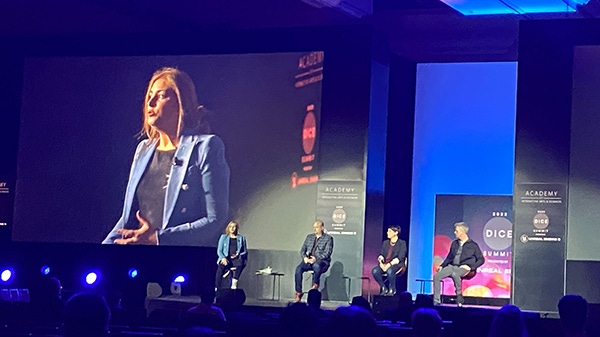Trending
Opinion: How will Project 2025 impact game developers?
The Heritage Foundation's manifesto for the possible next administration could do great harm to many, including large portions of the game development community.
Industry leaders from Riot, EA, and Microsoft have shared how their studios will get employees back in the office--even if it's only part-time.

With the COVID-19 pandemic taking a new shape, CEOs and companies in different fields are starting to figure out how corporate workers should be returning to office complexes. It's an extra-challenging field in digital work environments like video games, which have adapted so well to work-from-home that entire studios are being founded with all-remote structures.
And bigger companies--especially ones who want to retain talent in the year of the so-called "Great Resignation" are taking note. At DICE 2022, a conversation between studio leaders from Riot Games, Electronic Arts, Microsoft, and Keywords Studio about employee retention turned quickly toward discussions of how each company is managing their returns to the office.
Riot Games chief operating officer of games John Doyle shared the boldest predictions of the group when describing Riot's plans for 2022 and beyond. "I think the days of 5-day workweeks in the office are over," he predicted, explaining that Riot will likely retain its "1-3-1" strategy even if the COVID-19 pandemic moves to the endemic stage.
1-3-1 refers to the idea that employees can work from home on Mondays and Fridays, but go into the office on Tuesday through Thursday for essential meetings. EA COO Kate Kellogg said her company is looking at similar approaches, but also that she doesn't anticipate a "one size fits all" working for every team or every company.
Doyle did note that Riot is not requiring employees to return to their offices in the next few weeks. He indicated that such plans are being drawn up for "later in 2022," and made note of accommodating individuals who remain at high risk for COVID-19.
Why are studio leaders eager to get developers back in the studio? Microsoft head of Xbox Game Studios Matt Booty sung the praises of the "happy accidents" in the workplace--the quick conversations and impromptu encounters that can sometimes shape or improve a product.
Keywords COO Sonia Sedler agreed, but did share a more mercenary motivation--having employees working in the studio increases corporations' security prowess, which can be essential when working on certain clients or products.
Booty did add that Microsoft is paying attention to the improved social dynamics that emerged in virtual meetings as well. He pointed out that virtual conversations have enabled "new voices" to speak up in meetings, partly thanks to the proliferation of text chat that goes along with a video call. He said Microsoft has observed "meetings that happen within meetings" as developers jam on ideas in chat while one or two people speak on video.
It was fascinating to watch a conversation about employee retention shift so drastically into a discussion of in-person operations. Doyle noted that the video game industry's "Great Resignation" has been more of a "Great Reshuffle," as developers jump ship for companies with better pay, benefits, or promises of flexible remote work.
(Amusing note: Sedler shared a batch of statistics analyzing why employees quit their jobs in the pandemic. "Low pay" was not mentioned, or discussed by her colleagues.)
All of the leaders onstage seemed to acknowledge that remote work would partly be in the future for their employees--but also seemed of a shared mind that resuming in-person activities would be good for morale and productivity.
You May Also Like